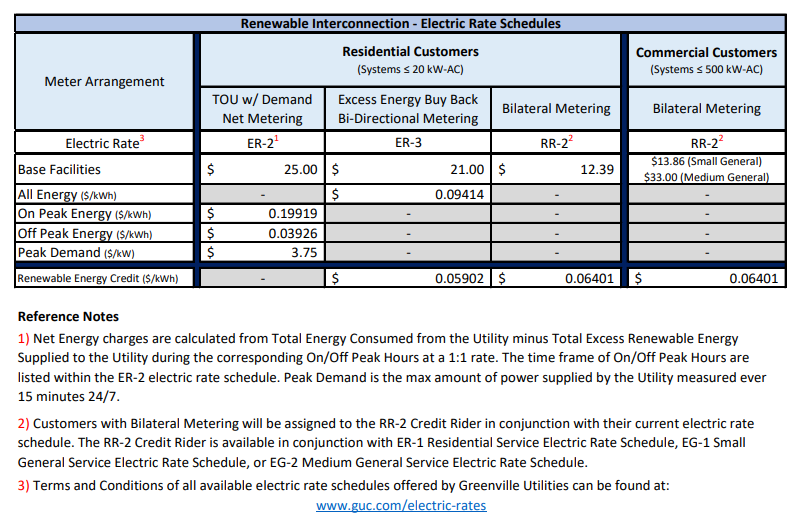Greenville Utilities supports innovative ways to use and conserve energy sources that protect our environment. Renewable energy resources, such as wind and solar energy, are playing an increasingly important role in meeting the nation’s energy needs. Today, there are many renewable technologies that are commercially available to homeowners and businesses that can be safely interconnected to our electrical grid. These resources are important to GUC’s balanced approach to meeting our region’s growing electrical needs and helping to establish a cleaner energy future.
Available Metering Options
Customers may sell the total output of their renewable energy resources to Greenville Utilities depending on the system size and meter arrangement selected.
System size is limited to:
- Residential Customers up to 20kW-AC
- Commercial Customers up to 500 kW-AC
- Systems >500kW shall obtain a Purchase Power Agreement with North Carolina Eastern Municipal Power Agency (NCEMPA) & coordinate project with GUC
Meter Arrangements
GUC currently offers three metering arrangements to customers planning to sell renewable generation back to the utility. Click to find out more detail about each one.
- Renewable Excess Energy Buy Back Bi-Directional Metering (aka Net Billing) more details
- Time of Use with Demand, Net Metering (aka Net Metering) more details
No longer available to new participants effective July 1, 2024. Current participants under this meter arrangement must transition to one of the other two meter arrangements by June 30, 2025. - Bilateral Metering (aka Buy All, Sell All) more details
Renewable Electric Rate Schedules
Depending on the meter arrangement selected, the customer will be assigned to the meter's applicable electric rate schedule.
- Residential Renewable Excess Energy Buy Back Bi-Directional Metering (aka Net Billing) more details
- Residential Time of Use with Demand, Net Metering (aka Net Metering) more details
No Longer available to new participants effective July 1, 2024. Current participants under this meter arrangement must transition to one of the other two meter arrangements by June 30, 2025. - Bilateral Metering for Solar Energy Facilities Credit Rider (aka Buy All, Sell All) more details
Side-by-side comparison of available electric rate schedule offered to residential and commercial customers:

Interconnection Application Process
Summary of Interconnection Procedures, Forms and Agreements
For additional information, contact Energy Services at 252-551-1524 or solarapplication@guc.com.
Information about Federal Solar Tax Credits can be found on the Energy Star and Department of Energy websites.
